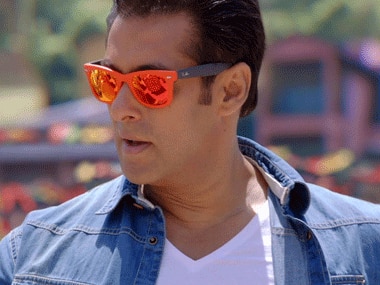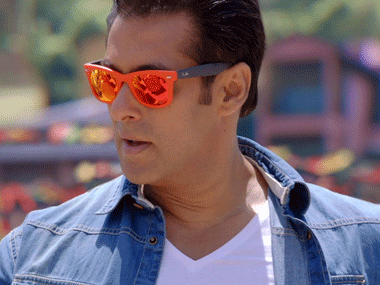Here is the progression of the kind of news headlines and articles you’re likely to read about Jai Ho in the coming days: Critics blast Jai Ho, call it violent, regressive and childish Salman Khan needs to call it a day Jai Ho is first blockbuster of 2014, earns Rs 200 crore at box office in less than 30 seconds. And then there will be the tweets, Facebook posts and SMS jokes related to the movie. All this is just further evidence of an elementary truth that we know but bears repeating: Salman Khan films — famously but not uniquely critic-proof — are a genre unto themselves. It’s also given rise to a tribe that is so much more than a fan club: the Bhai-sexuals, people (mostly men) who go to the movies only to see Salman Khan in action, aka Bhai. With 2009’s Wanted, which gave wings to the maar-dhaad genre in the wake of Aamir Khan starrer Ghajini (2008), Bhai porn, as Khan’s unique brand of cinema has been termed by some reviewers, became the industry’s wet dream. With box-office figures proving that audiences are willing to pay good money to watch Khan play the same role again and again, despite the fact that the man can barely act, neither the industry nor the dedicated audience of Bhai porn seems to be in the mood to wake up. [caption id=“attachment_1357941” align=“alignleft” width=“380”]  Courtesy: Facebook[/caption] In a recent Koffee With Karan episode, Aamir Khan said he envied Salman because “all he needs to do is show up and shake his belt (a dance step from one of his movies) or hang his sunglasses from the back of his collar (his signature move in the Dabangg films).” He’s right, of course. Salman doesn’t need to actually act anymore and this has never been more evident than it is in Jai Ho, an atrocious Sohail Khan vehicle that should rank as his worst performance ever. That’s saying a lot if you look at Khan’s recent releases. In Jai Ho, a remake of Stalin which was a remake of Pay It Forward, Khan does what he does in every movie: bash up baddies, maaro dialogue, romance the leading lady, dance (or whatever those weird, staccato movements he does are called) and generally save the day. But, this time, it doesn’t look like he’s having fun with it anymore. In Wanted, despite stilted delivery and limited range, it looked like Bhai was giving it his all. In Dabangg (2010), Bhai was at his best, striking the right balance between exaggeration and self-parody. But since then, unless controlled by a competent director like Kabir Khan (as in Ek Tha Tiger), Khan appears to be winging it. As in Ready (2011) and Bodyguard (2011), his idea of emoting in Jai Ho involves the following steps: a) Squint at something really hard. b) Flex muscles. c) Purse lips slightly and add tears if it is a particularly emotional scene. At Bandra’s Globus theatre, a morning screening was filled with enough Bhai-sexuals who didn’t care for his acting skills or lack thereof. One guy next to me applauded as Khan plodded his way through a painful scene while sporting fluorescent green Ray-Bans (seriously, this is a ’thing’ in the movie) and attempted to have a romantic conversation with newcomer Daisy Shah, the greatest contributor to the Duckface Revolution since Nargis Fakhri. Delivering lines like “Hello, could you turn your attention back to the pavilion?” in his trademark Bandra-meets-Bronx accent, Khan had the audience eating out of his hand. He didn’t seem to be having as much fun as he did, for instance, with Dabangg. Bhai sexuals, of course, don’t seem to care as much about the movie when Khan isn’t on screen. So they don’t seem to either care or register that Jai Ho is a shrill, melodramatic movie, boasting a cast of veterans such as Danny Denzongpa and Tabu as well as a who’s who of Actors Who Are Out Of Work – Aditya Pancholi, Sharad Kapoor, Ashmit Patel, Vikas Bhalla, Nauheed Cyrusi, Vatsal Seth and Tulip Joshi. These actors barely held the attention of the audience when Beloved Bhai wasn’t on screen. For instance, during a Bhai-less emotional scene, the guy next to me started chatting with his friend and texting. Two minutes later, Bhai appeared on screen and this gent abruptly stopped texting – he needed his fingers to whistle, you see. This isn’t cinema; it’s a cult of personality that we’re paying to watch in theatres. At this rate, we’re about three films away from watching theatrical versions of two-and-a-half-hour-long Salman Khan screensavers. Jai Ho is about two-thirds of the way there. (Suprateek Chatterjee is editor of Visual Disobedience, a community for emerging indie artists, and a freelance writer. In his spare time, he likes to compose music with his electro-rock band Vega Massive and his Twitter handle is @SupraMario.)
At this rate, we’re about three films away from watching theatrical versions of two-and-a-half-hour-long Salman Khan screensavers. Jai Ho is about two-thirds of the way there.
Advertisement
End of Article


)
)
)
)
)
)
)
)
)



